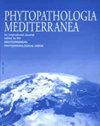Bacillus-based products for management of kiwifruit bacterial canker
IF 1.9
3区 农林科学
Q2 AGRONOMY
引用次数: 3
Abstract
Pseudomonas syringae pv. actinidiae is an important pathogen of kiwifruit (Actinidia deliciosa), and bacterial canker of this host is managed by monitoring and chemical control strategies. The efficacy of the bio-pesticides Amylo-X® (based on Bacillus amyloliquefaciens subsp. plantarum strain D747) and Serenade Max® (strain QST713 of B. subtilis) was evaluated by in vitro and in vivo experiments. Both antagonists inhibited different biovars of the pathogen in in vitro assays; QST713 was more efficient than D747. The two Bacillus strains also colonized A. deliciosa flowers (c. 105-7 cfu per flower) up to 96 h after inoculation. D747 persisted on leaves (c. 104-6 cfu cm-2) up to 4 weeks after inoculation, during 2 years in Emilia Romagna and Latium regions of Italy. On flowers, the antagonists reduced pathogen populations, compared to untreated (control) flowers. On A. deliciosa and A. chinensis plants under controlled conditions, Amylo-X® reduced severity of bacterial canker, providing ca. 50% relative protection on A. deliciosa and 70% on A. chinensis. Serenade Max® was less effective, giving 0% relative protection on A. deliciosa and 40% on A. chinensis. In a field trial, on A. deliciosa plants, Amylo-X® reduced the severity of bacterial canker on leaves, providing ca. 40% relative protection. The sensitivity of both antagonistic strains to streptomycin sulphate was confirmed by testing the most used concentration where antibiotics are approved for management of bacterial pathogens.猕猴桃细菌性溃疡病的杆菌制剂
丁香假单胞菌。猕猴桃酸菌是猕猴桃(Actinidia deliciosa)的重要病原菌,猕猴桃酸菌溃疡病的防治主要采用监测和化学防治策略。生物农药Amylo-X®(基于解淀粉芽孢杆菌亚种)的药效研究。plantarum菌株D747)和Serenade Max®(枯草芽孢杆菌菌株QST713)通过体外和体内实验进行评价。在体外实验中,两种拮抗剂均抑制病原菌的不同生物变体;QST713比D747更有效率。接种后96 h,两株芽孢杆菌也可在香豆花上定殖(每花约105-7 cfu)。在意大利艾米利亚-罗马涅和拉丁地区,D747在接种后可在叶片(约104-6 cfu cm-2)上持续4周。在花上,与未处理的(对照)花相比,拮抗剂减少了病原菌的数量。在受控条件下,Amylo-X®降低了香曲霉和中国香曲霉的细菌性溃疡病的严重程度,对香曲霉和中国香曲霉分别提供了50%和70%的相对保护。Serenade Max®的效果较差,对美味A.的相对保护为0%,对中国A.的相对保护为40%。在一项田间试验中,在香豆科植物上,Amylo-X®降低了叶片上细菌溃疡病的严重程度,提供了约40%的相对保护。这两种拮抗菌株对硫酸链霉素的敏感性通过检测最常用的浓度得到证实,这些浓度被批准用于细菌病原体的管理。
本文章由计算机程序翻译,如有差异,请以英文原文为准。
求助全文
约1分钟内获得全文
求助全文
来源期刊

Phytopathologia Mediterranea
生物-植物科学
CiteScore
4.40
自引率
8.30%
发文量
28
审稿时长
6-12 weeks
期刊介绍:
Phytopathologia Mediterranea is an international journal edited by the Mediterranean Phytopathological Union. The journal’s mission is the promotion of plant health for Mediterranean crops, climate and regions, safe food production, and the transfer of new knowledge on plant diseases and their sustainable management.
The journal deals with all areas of plant pathology, including etiology, epidemiology, disease control, biochemical and physiological aspects, and utilization of molecular technologies. All types of plant pathogens are covered, including fungi, oomycetes, nematodes, protozoa, bacteria, phytoplasmas, viruses, and viroids. The journal also gives a special attention to research on mycotoxins, biological and integrated management of plant diseases, and the use of natural substances in disease and weed control. The journal focuses on pathology of Mediterranean crops grown throughout the world.
The Editorial Board of Phytopathologia Mediterranea has recently been reorganised, under two Editors-in-Chief and with an increased number of editors.
 求助内容:
求助内容: 应助结果提醒方式:
应助结果提醒方式:


